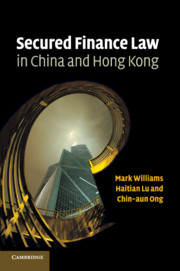Book contents
- Frontmatter
- Contents
- Preface
- Table of cases
- Table of legislation
- 1 Introduction
- 2 Security over tangible personal property
- 3 Security over intangible personal property
- 4 Company security over personal property
- 5 Hire-purchase, leasing and conditional sale of tangible personal property
- 6 Priority of security interests over personal property
- 7 Enforcement, and creditor's remedies
- 8 Conclusion
- Index
- References
1 - Introduction
Published online by Cambridge University Press: 03 May 2011
- Frontmatter
- Contents
- Preface
- Table of cases
- Table of legislation
- 1 Introduction
- 2 Security over tangible personal property
- 3 Security over intangible personal property
- 4 Company security over personal property
- 5 Hire-purchase, leasing and conditional sale of tangible personal property
- 6 Priority of security interests over personal property
- 7 Enforcement, and creditor's remedies
- 8 Conclusion
- Index
- References
Summary
Over many years, commentators have observed that the law governing credit security over personal property in common law jurisdictions (such as Australia, England, Malaysia and Singapore) is generally complex, cumbersome and inadequate, and have called for radical reform of the law. The same is true of the Hong Kong Special Administrative Region (‘Hong Kong’). Being a former British colony, Hong Kong's legal system has a common origin with and exhibits similar features to these jurisdictions. However, the Hong Kong Law Reform Commission has yet to turn its attention to this topic and call for a comprehensive review of the existing structure of credit security law affecting personal property.
China's legal system largely follows the continental civilian model and has not yet enacted a comprehensive civil code despite almost thirty years of transition from a classical socialist model to one that more closely resembles capitalism. Although the influence of common law systems has become more noticeable in Chinese law in recent years, the fundamental concepts and principles of Chinese civil law originate from the German paradigm.s Intensive legislative effort in the last twenty years has begun to create a unified and systematic legal framework. However, its credit security legal framework over personal property has been generally recognised as being both inadequate and ineffective. Despite this state of affairs, no comprehensive review of the credit security legal framework has been undertaken in China.
- Type
- Chapter
- Information
- Secured Finance Law in China and Hong Kong , pp. 1 - 35Publisher: Cambridge University PressPrint publication year: 2010



